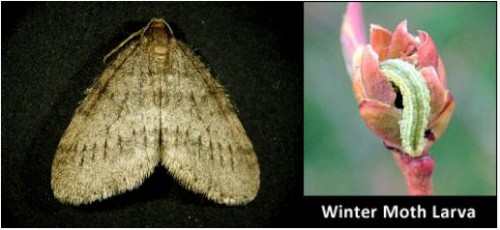Winter moth caterpillars

Heather Faubert of URI Extension
Here is a Pest Alert from Heather Faubert, URI Cooperative Extension
To Fruit Growers:
Winter moth caterpillars started hatching on Sunday, April 19th. Many blueberry and apple growers sprayed insecticide over the weekend, protecting flower buds from winter moths. Today we are getting heavy rain and there are still many winter moth eggs to hatch. Will insecticide applied over the weekend last through all winter moth eggs hatching? Good question! Rule of thumb tells us that pesticides last for up to 2 inches of rain. Following this rule, winter moth caterpillars should continue to be killed after today’s rain. I admit I am worried about apples and blueberries having sufficient insecticide coverage after today, especially in areas with high populations of winter moths.
So what to do – if you haven’t sprayed yet, I suggest you apply an insecticide Tuesday or Wednesday. If you did already spray and you know you had a high winter moth population last year, consider applying another insecticide Tuesday or Wednesday. If you don’t think you have a lot of winter moths – if you didn’t have problems last year – I think you don’t need to spray.
 Once winter moth caterpillars are inside buds, you can’t control them with an insecticide until close to bloom – probably in early May. When flower buds expand but before blossoms open (apple and blueberry ‘pink’ bud stage), winter moth caterpillars move around and are once again susceptible to insecticide applications. At this time, organic approved Bt insecticides such as DiPel DF or Agree WC are also effective controlling winter moth caterpillars. Other organic treatment options include Entrust SC Naturalyte Insecticide and Neemix.
Once winter moth caterpillars are inside buds, you can’t control them with an insecticide until close to bloom – probably in early May. When flower buds expand but before blossoms open (apple and blueberry ‘pink’ bud stage), winter moth caterpillars move around and are once again susceptible to insecticide applications. At this time, organic approved Bt insecticides such as DiPel DF or Agree WC are also effective controlling winter moth caterpillars. Other organic treatment options include Entrust SC Naturalyte Insecticide and Neemix.
The way to determine if a pre-bloom spray is needed is by inspecting your flower buds starting in about one week (April 27). You will need to dissect buds and see if there are winter moth caterpillars inside.
Send questions to Heather Faubert, URI Cooperative Extension via email to hhf@uri.edu or call the office at 401-874-2967 or Heather’s cell phone at 401-256-7438.
